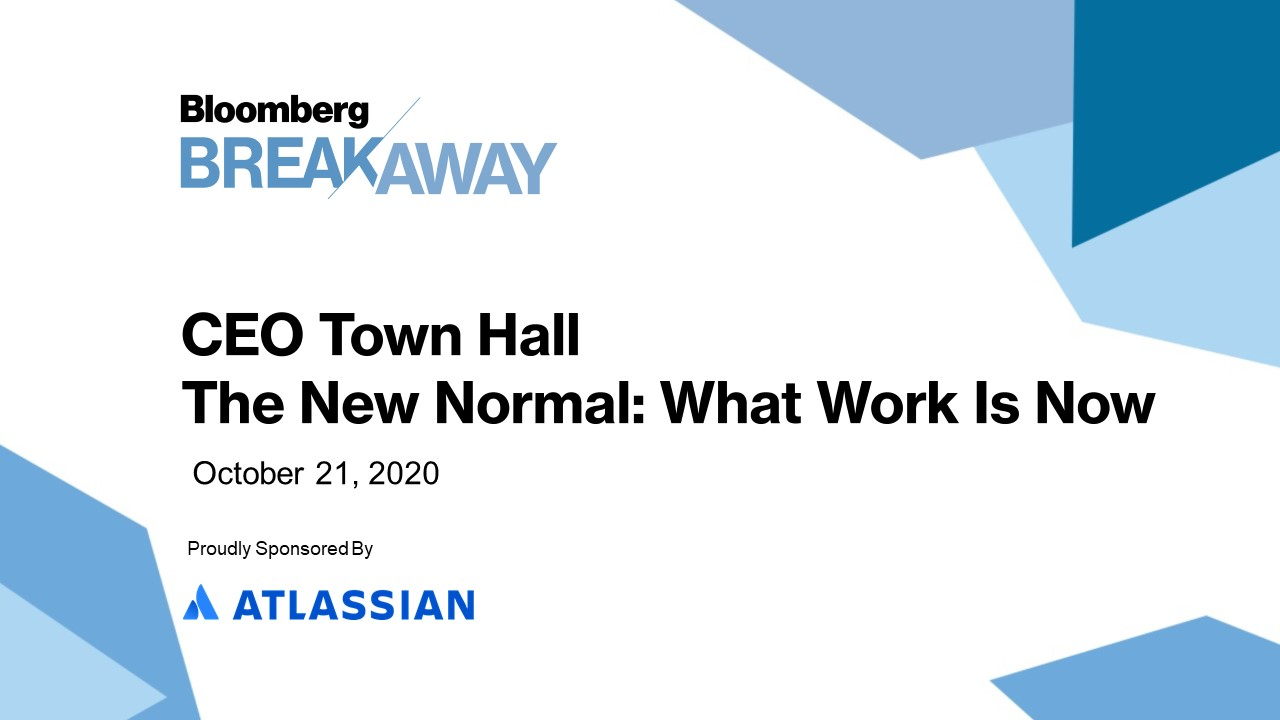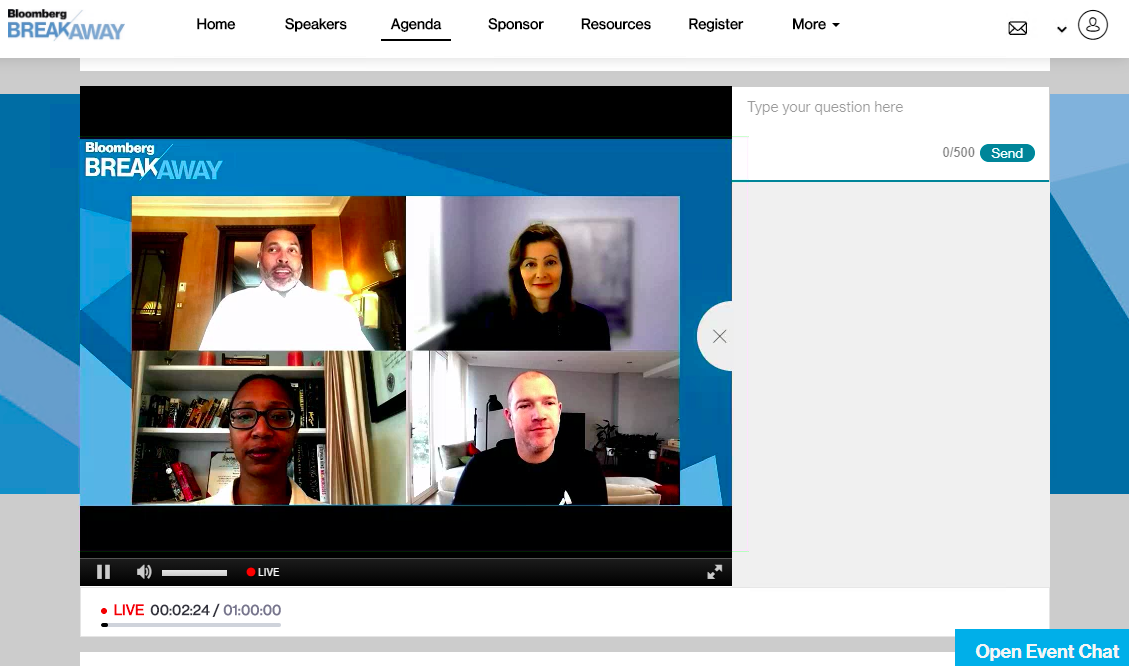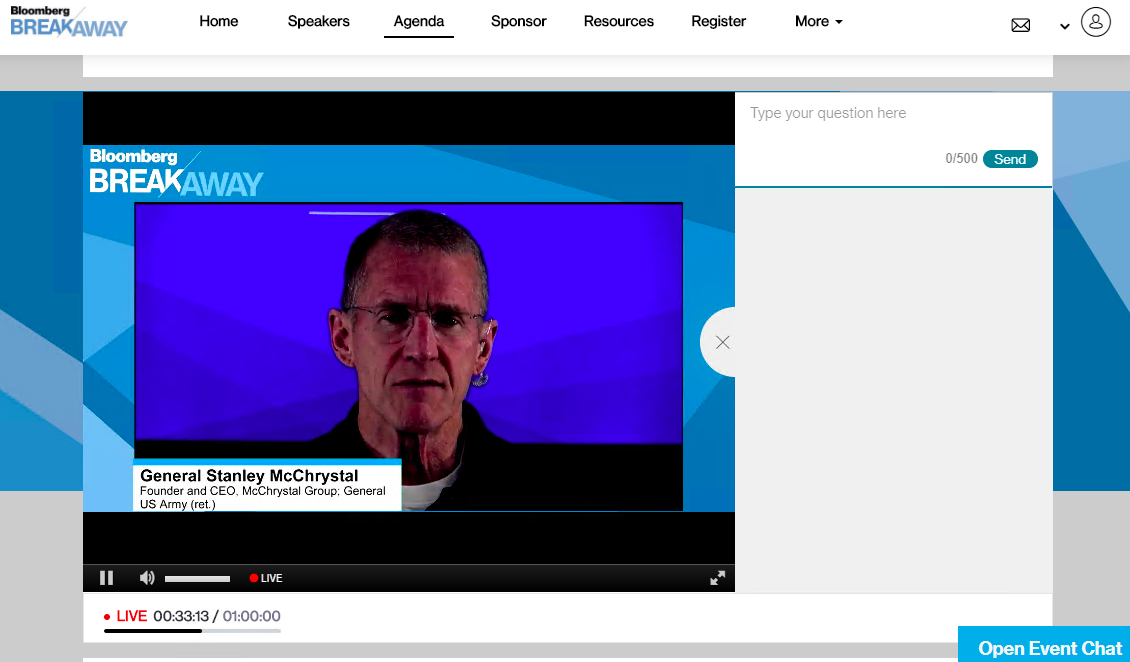By Kiley Lambert, Bloomberg Live
At the Bloomberg Breakaway CEO Town Hall, experts and industry leaders gathered to discuss what companies should be doing now to increase the scope of and focus on inclusivity as they look to build highly effective teams in a remote-work environment.
Speakers included:
- Deanna Mulligan, Board Chair, Guardian Life Insurance; Author, Hire Purpose: How Smart Companies Can Close the Skills Gap
- Dominic Price, Resident Work Futurist, Atlassian
- Stan McChrystal, Founder and CEO, McChrystal Group; Four-star Gen. U.S. Army (ret.)
- Chris Michel, Head of D&I Americas, Bloomberg L.P.
- Adia Harvey Wingfield, Professor of Sociology, Washington University in St. Louis
- Carol Massar, Anchor, Bloomberg Businessweek TV & Radio; Host, Bloomberg Breakaway Summit
Keep reading for more highlights— and you can watch the full event here.

A few of the key takeaways:
- On “walking the talk” when it comes to putting inclusivity efforts into practice, Adia Wingfield, Professor of Sociology, Washington University in St. Louis, said that it’s critical for organizations to bring in mid-level managers to help create solutions. “Often managers can be left out of these types of strategies and that when they are too top-down, it doesn’t necessarily address the types of solutions that are useful at middle levels for acknowledging the challenges that workers are facing across the board. And it’s important to make sure again that even if we’re focusing on mid-level managers, we’re not excluding workers who are in various tiers of the organization itself.
“It also is really useful to know that there are ways that [managers] can be part of the solution rather than simply giving instructions to be more attuned to diversity; without clear, specific guidance about what that looks like when managers are brought into ways that they can readjust hiring, ways that they can think about mentoring programs and how those can reach everybody. The data indicate that these are concrete strategies that really are able to move the needle.”
- Dominic Price, Resident Work Futurist for Atlassian, the event sponsor, added: “One of the things that we’ve done a little bit differently, instead of measuring diversity and inclusion at the organizational level, which we still do, we’ve actually started to measure it at the team level. So, instead of saying, it feels all right in an aggregate, but actually if you take gender, for example, you’ve got sort of all the females in one part of the organization, all the males in the other, that’s not diversity, right? And so how do we do it at a team level? And how do we help teams not only assess that, but correct it?
“I think there’s upside in the current future of what we’re experiencing. You know, there’s lots of bad things about Covid and the pandemic. But if you think about work from home and flexibility, it gives us access to a way more diverse talent pool in terms of caregivers, the disabled, the whole of the people that physically can’t get into an office.”
- Echoing those themes, Deanna Mulligan, Board Chair, Guardian Life Insurance; Author, Hire Purpose: How Smart Companies Can Close the Skills Gap, said: “We have seen that remote work promotes flexibility, which helps promote inclusion and diversity. It gives us an opportunity to hire from lots of different locations, which is also important. And then the final thing is our training and our evaluation of managers includes the model that a good manager manages a diverse team. And uses that tapestry of experience Dom and Adia were speaking of to produce results. So, I agree with what Dom was saying that you should be measuring diversity at all levels. And we actually look at it at the leader level or the managerial level.”
- On broadening the definition of inclusivity, Wingfield said that companies also need to be on the lookout for the struggles employees are facing in their own lives now that the line between work and home has been essentially erased for many people. And that these changes taking place now during the pandemic need to be implemented as part of a permanent strategy. “I really would like to see organizations making shifts to make these kinds of changes more permanent. The only things that I would suggest are that, again, I think it’s really important for organizations to think about how having racially diverse employees means that you want to take into consideration what various constituencies in your organization will be impacting. And I think we also want to think about how the types of policies that are being put in place from organizations might be expanded more broadly.”

- Stan McChrystal, Founder and CEO, McChrystal Group; Four-star Gen. U.S. Army (ret.), said that many organizations that might have breathed a sigh of relief at finding that remote work was actually workable might not be paying attention to all the signals several months down the road. “I would argue most organizations don’t know what’s gonna work even two years from now, Because there are a number of factors driving it. One, we don’t know if you make the decision to get rid of your offices and work entirely from home. We don’t know what the dynamics of interpersonal relationships over time will be as you forget the times when you were together around the coffeepot. We don’t know about leader development. We don’t know how the market will change, how our competitors will adapt. So, assuming that there is a new normal, this is it, and we’re gonna lock it down and move forward to greatness, I think, is not paying attention to the fact we are on stormy seas with heavy winds and it’s gonna keep pushing us [in] multiple directions. And what we have to do is be very cognizant of what’s happening and continue to adjust.”
- McChrystal also sounded an alarm for companies that plan to continue to work primarily remotely. “My personal view is those [companies] that bring workers back are going to have an advantage. If we think about what builds trust. Trust is built through interaction with people over time. And it’s many things. You trust someone that you see a lot, you watch their behaviors, you know their intentions. It’s harder to build up trust through a virtual medium or with someone that you don’t deal with very often. And trust cuts down transaction costs, so it makes you better.
“What do we do in most organizations? We do team-building events. Now, having said that, I think that organizations that say, ‘Okay, everybody’s gonna come back to the way it was in 1953. And we’re gonna avoid technology,’ are making a big mistake, too.
“I think the people that you’ve got to be bonded with, you are gonna have to have a face-to-face interaction with pretty frequently to make that as powerful as we hope it’ll be.”
- On creating a remote-work culture that harnesses technology in the right ways to build inclusivity, McChrystal said: “We’ve gotta be more intentional about communicating our priorities, making sure that the information we put out is clear and as complete as we know. But, we also have to be intentional about being inclusive and creating diversity, which means if you’re virtual and you want to just get together with the people you know a lot, you call them up and interact. You’ve got to be more thoughtful. You’ve got to pull different parts of it together, which requires a little bit of planning. It takes a little bit more [than] Outlook calendar management in my view, so that you actually reach out to all the people and bring them onto the team. I argue it’s harder now because it doesn’t happen organically.”
- On the competitive advantage of diversity, McChrystal said: “The first thing you have to understand is if the United States of America is gonna be competitive, we can’t leave anybody on the bench. We don’t have enough numbers and enough well-educated talent to leave anybody uneducated or anybody unused when we compete in the world marketplace. Diversity … makes you more competitive. It makes you more effective. So, diversity should be something that people lever just like any of the other advantages that an organization can do to make sure all of its talent gets into the room. And that’s just common sense.”

Bloomberg Breakaway’s CEO Town Hall was Proudly Sponsored By

——————————
Join the Conversation: #BloombergBreakaway
Instagram: @BloombergLive
LinkedIn: Bloomberg Live
Twitter: @BloombergLive
Interested in more Bloomberg Live virtual events? Sign up here to get alerts.
——————————